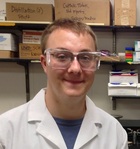Clemson University
Community for the latest research in new membrane materials.
Summer 2013 REU Poster: Coupling small-particle adsorbents with membranes for trace-contaminant removal in water treatment
Host: Coupling Small-particle Adsorbents
The application of superfine powdered activated carbon (S-PAC) for drinking water treatment is part of recent advances in nanomaterials to develop microporous materials for adsorption. Micro/Ultrafiltration has been proposed as a means of removing S-PAC from the effluent drinking water stream, however, its affects on flux decline as well as its small scale breakthrough have not been previously explored. This project focuses on characterizing the membrane flux decline caused by S-PAC fouling and various methods to induce aggregation, as well as utilizing synthesized radiolabeled carbon nanospheres to track membrane breakthough.
Registration
This Poster Session has ended, but you can view its content in the archive below.Archive
Please register above to view this Poster Session.
Presenters

Connor Bilchak
REU Program 2013, Clemson University
Connor is currently a rising senior at Manhattan College in Riverdale, New York. He will graduate with his B.S. in chemical engineering in the spring of 2014, also having earned minors in both mathematics and chemistyry. Connor hopes to remain at Manhattan College to complete his M.S. degree, after which he hopes to seek a position regarding petroleum engineering. He aims to return to academics later in his life, with the ambition of earning a Ph.D in order to become a professor.
Connor is a veteran of the NSF REU program, having previously participated in the Research in Science and Engineering (RiSE) program at Rutgers state university of New Jersery at Piscataway. His research there studied the effects of branch chain amino acids on oxidative stresslevels frollow an acute inflammatory reponse.
Connor enjoys playing piano (along with numerous other instruments) as well as composing his own original music, and writing original fictional short stories. He also enjoys running and soccer. He currently resides in upstate New York

Anna Crumbley
Undergraduate Researcher, REU Program 2013, Clemson University
Student at The University of Alabama in Chemical and Biological Engineering
Advanced Functional Membranes: Membranes for Water Purification REU 2013 at Clemson University
